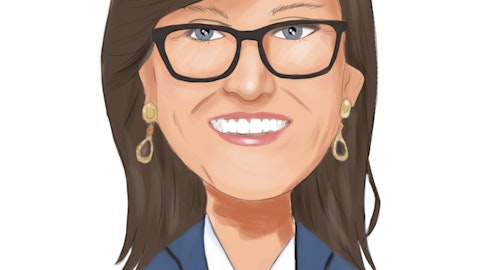But I think that the — if you like the perceived value of the security is around those numbers.
Nehal Chokshi: Got it. Understood. Thanks Ziv for clarifying my question and the rest for further detail there. So yesterday, you did a press release based on some survey of 1,000 SMB customers of 50 employees or less. And it’s great that 70% are looking to our network security provider or your communications. Do you have any visibility as to what the other 30% are looking to do as far as security then?
Erez Antebi: Hey. Excellent question. I do not. It wasn’t the part we were focusing on, honestly, in the survey. Yeah, certainly, we run surveys like this, our marketing department run surveys like this for — in different countries globally for different segments of the market and we published the results from time-to-time. Yeah, what we see consistently in all these services is that, a majority percentage-wise changing, but basically a majority of customers, whether they are consumers or SMBs or so on, understand that they need to be secured and they understand that there are threats that they understand somebody needs to help them secure and that a very, very large portion is looking at the operator is the one who will secure them. If you ask me to guess, I am here, I am just guessing and the others either don’t think they need security or they think that they can take care of themselves or a variety of other things like that.
Nehal Chokshi: Okay. Very good. And then as these large deals that have gotten delayed, how much bigger are they relative to average sites you typically see?
Erez Antebi: How much are they, sorry?
Nehal Chokshi: On the DPI side, the large deals that have been got delayed
Erez Antebi: Yeah.
Nehal Chokshi: that haven’t been lost
Erez Antebi: Yeah.
Nehal Chokshi: how much
Erez Antebi: Yeah.
Nehal Chokshi: are they the near typical average deal size that you are seeing?
Erez Antebi: They are quite large. I mean they are definitely in the millions of dollars, okay? That’s — I will put it that way. It’s not — we have many deals of various sizes. These are large.
Nehal Chokshi: And typically, what’s the size of the deal then outside of these large deals?
Erez Antebi: I know, Ziv, do you know what the average deal size we have is?
Ziv Leitman: No. But I think it’s — the average is not really significant since there is larger — the standard deviation is relatively wide. So we can have a deal of $300,000 and we can have a deal of $3 million and more. So the average will mean really nothing.
Nehal Chokshi: Got you. Understood. Okay. So it’s just simply do you have a larger proportion of large deals in the pipeline than usual?
Erez Antebi: Yes. We are seeing that we are — we are seeing today more large deals, I think, than we saw a couple of years ago.
Nehal Chokshi: Got it. Understood. Okay. And then, Erez, did I hear you correctly, did you give an incremental market target for calendar 2023 or that was calendar 2022?
Erez Antebi: No. Calendar 2022. We are not to give anything on 2023.
Nehal Chokshi: Okay. Great. Thank you.
Operator: The next question is from Marc Silk from Silk Investments. Please go ahead.
Marc Silk: Thank you for taking my questions. I will add on to the group, congratulations on the Verizon deal. It just gives your technology a lot of credibility, and hopefully, that will open up more doors to future deals. So on your — on previous calls, you have talked about on your traffic management and analytics. You have been awarded several deals where you will be replacing a direct competitor’s product. In the slowing economy going forward, why would they switch from a competitive product as opposed to basically doing nothing?



